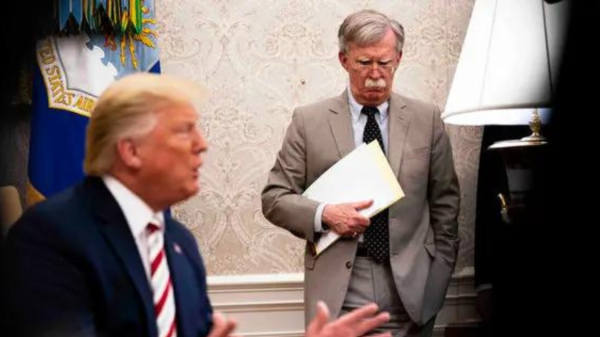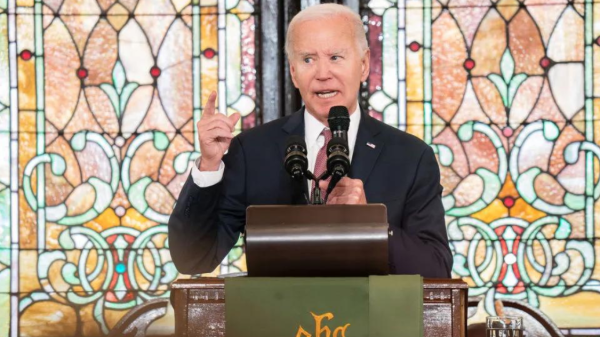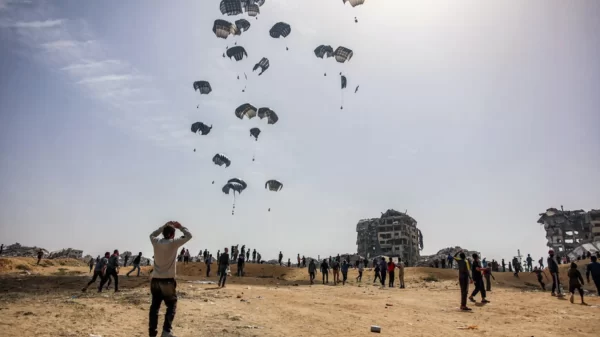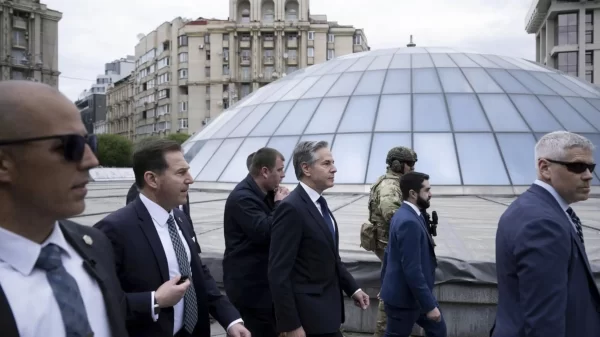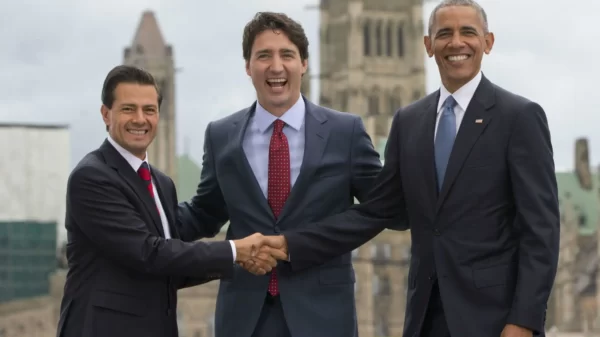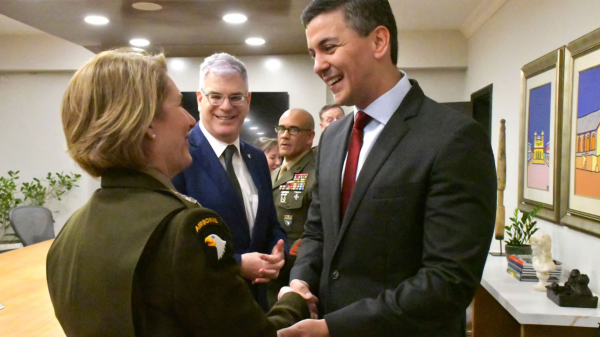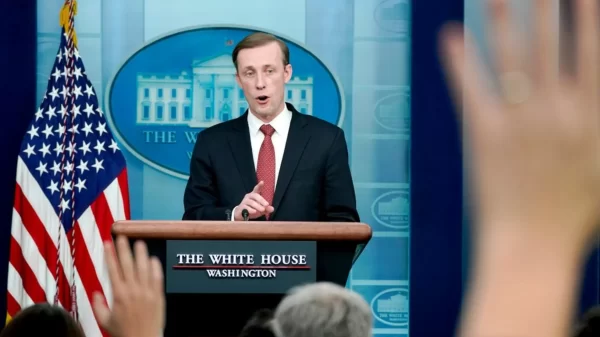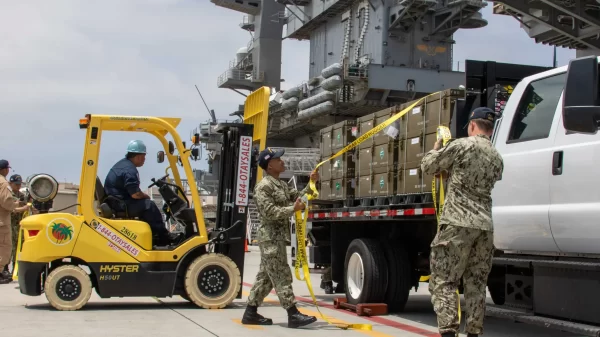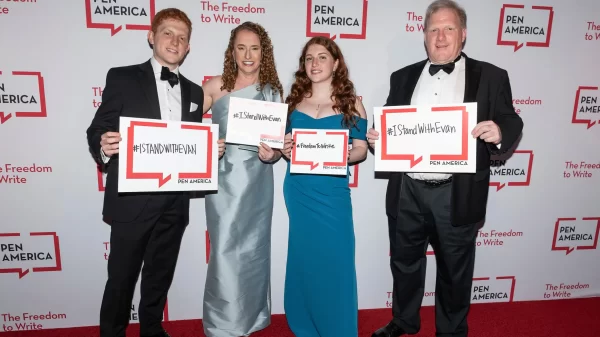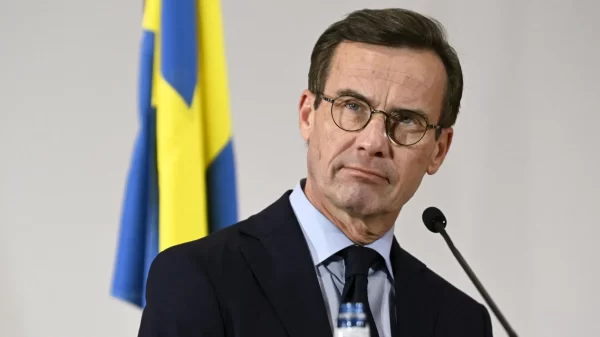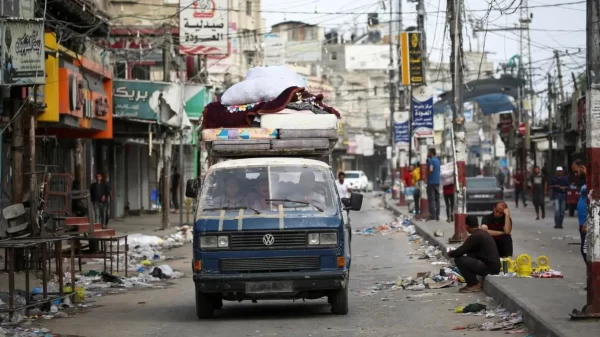Not all nuclear deals are equal. In what might be amongst the most fascinating pieces of information revealed in the federal indictment of financier and former advisor to Donald Trump, Tom Barrack, regarding his misadventures representing the United Arab Emirates, the advisor and near ambassador was actively pushing for an eventual Saudi Arabian Nuclear Deal, in which the perennial human rights violators in particular would, instead of being pushed towards further reconciliation of themselves and their society with international human rights norms, simply be granted, sold rather, civilian grade nuclear reactors. In this scenario, through a venture that, ideally, Tom Barrack would’ve been a part of either with American investors, or the notorious and chronically misused Saudi Public Investment Fund (PiF), the Saudis and Emiratis would benefit, the President would appear to be the great American deal maker, while the aforementioned Barrack and his oligarch friends would pocket a lot of money.
That Tom Barrack’s entire plan fell apart because it was so suspicious to so many different agencies and parties should help people to understand his political and diplomatic know-how and why he first left politics all the way back in the early 1980s. Yet this is the subject for another discussion and time. To return to the topic at hand, while the famous and currently deceased Iranian Nuclear Deal was meant to bring Iran back into the international community of nations while incentivizing their reformation of domestic policies and hopefully, personal and civic freedoms in the process, this Saudi Nuclear Deal seemed a purely transactional endeavor on some levels, while also an incredibly dangerous and potentially reactively explosive piece of foreign policy on others. Giving Saudi Arabia, as well as the United Arab Emirates, American nuclear materials and equipment, even at civilian grades, would be a clear challenge to Iran regionally speaking, and would likely signal, along with the UAE-Israeli “Peace” Deal, of which led directly to vast weapon sales, a trilateral, potentially nuclearly capable partnership of American protectorates within the very near vicinity of Iran.
The effects of this cannot be understated, surely. With the Iranian Nuclear Deal still a thing of the past, it would have created a remarkable situation for America to negotiate into the foreseeable future. It would likely have pushed Iran further into the arms of Russia and even further into the sphere of China, while further cementing ties to Syria and their longtime dictator, Bashar al-Assad. Appraising both Nuclear Deals further, one can see how costly Donald Trump’s departure from the JCPOA will likely be for the United States, in one way or another, should Joe Biden succeed in reconciling his predecessors’ unilateral decision, and how dangerous that which Donald Trump tried to replace it with, within neighboring nations like Saudi Arabia and the UAE, might have been had the plan been successfully executed.
The Iranian Nuclear Deal: A Good Start towards International Reconciliation Before It Was Stopped Dead In Its Tracks
The Iranian Nuclear Deal, or the Joint Comprehensive Plan of Action, henceforth known here as the JCPOA, was first thought of and designed as a way of reconciling the United States, as well as other nations, with Iran after so many decades of ill-will and conflict. When the administration of Barack Obama began quite secretive and low-key negotiations with that administration of then-Iranian President Mahmoud Ahmadinejad upon winning the Presidency in the 2008 United States Presidential Election, it was the beginning of a diplomatic dance that would see Ahmadinejad’s successor, the moderate reformist Iranian diplomat Hassan Rouhani, eventually, alongside the international and American diplomats at the time, get a deal in place and signed with the powerful nations of the United Nations Security Council plus Germany, alongside the European Union, to begin the process of bringing Iran back into the greater diplomatic and economic international community of nations.
The signing of that deal in 2013, and its subsequent implementation beginning in 2016, just over six years ago at the time this piece was written, should have helped create lots of positive innovations vis-a-vis the American-Iranian relationship and yet, was reneged upon by the United States under Barack Obama’s successor, the 45th American President Donald Trump, just a few years into a longterm, 15-plus-year agreement. The fallout of this action cannot really be properly stated in the correct magnitude, yet it continues to create fallout within the nation of Iran itself, socially, culturally, and politically. It has affected how Iran has behaved in the years since on the international stage as well, although they generally are as regionally active within their community as any other nation of ambition tends to be. The decision by Donald Trump also continues to affect the United States, as the 46th President looks to find a way to recreate, quite likely in some revised sense, the previous nuclear deal.
For Joe Biden, however, this will be extremely difficult. Donald Trump, by reneging on the Iranian Nuclear Deal without renegotiating or looking to work on some type of compromise with Iran, was always going to leave his successors in an incredibly difficult position, diplomatically speaking. Obviously, working on relationships in an international sense is really positive and important, and as the JCPOA would have likely helped to grow a relationship with Iran diplomatically, economically, and culturally, while aiding, incentivizing, and enjoying open communications with the nation during some really tough years and tribulations, it is little wonder why Joe Biden would like to secure a new Iranian deal, preferably before the by-elections, and certainly, before his time in office comes to an end.
However, because of the way that Donald Trump left the agreement, there are real problems involved in creating a new one, or even resurrecting the old one. When the old deal was left by Donald Trump and the United States, thanks in large part to both Israel and the Republican Party of the United States, it left the international credibility of American diplomatic agreements at, perhaps historically low levels. If American deals cannot be guaranteed from administration to administration, then these agreements hold little value or weight to or in the international community. Furthermore, as if antagonizing and hinting at leaving the agreement, all the way up until the decision was finally made to do so, wasn’t in poor enough taste, as well as bad deal-making in the interests of the United States, Donald Trump then authorized the assassination of one of the most politically powerful, and the most powerful military figure in the entire nation, former Iranian Quds Force Commander Qassem Soleimani.
These two actions will be linked with the administration of Donald Trump forever, alongside the fallout from each, and the history books will be unkind to him in this way, as in so many others. Together, they put Iran, dealing already with mass poverty, some of it of America’s doing, and some of its own doing of course, as well as water shortages and mass opiate addiction, the latter a horrifying reality that America too has struggled to cope with, right back in the bad place they had been in before the JCPOA had been signed in 2013; it is all a collective mass of individual missed opportunities.
With sanctions back in place, just in time for the COVID-19 pandemic to begin sweeping the world, Iran has stood, and continues to stand, with little to no chance of escaping this blight without mass suffering and severe loss of life. Disconnected from the world and continuously antagonized by the Trump administrations’ “Maximum Pressure” theory of foreign policy, it is little wonder that they turned down the aid presented to them by that administration as the plague swept across nations and continents; furthermore, it is little wonder that the trend of distrust of the moderate reformers that had been fomenting inside Iran as the Rouhani administration faced internal and external pushback to their liberalization of Iran and their diplomatic reconciliation with the west, has further intensified in the time since the Nuclear Deal was walked away from. The combined burdens of renewed sanctions, mass poverty and opiate addiction, the assassination of Qassem Soleimani, the global development that is the COVID-19 crisis, water shortages, as well as the new regional innovation that is the reconquering of Afghanistan by the Taliban after the United States recently, and finally, left after twenty years of occupation, are a great many to bear at one point for any country.
This all, over the last year or two in particular, has further developed to the point where parliamentary and Presidential elections gave the reactionaries and originalists further power in the federal government and in local constituencies, as well as the Presidency. Ebrahim Raisi, the former Judge and accused international human rights violator for his role in the mass murder of Iranian leftists in Tehran in 1988, is now the President of Iran, and will very likely become the Supreme Leader of the nation once Ayatollah Ali Khamenei finally passes away.
The Ayatollah wants a new nuclear deal, just as he wanted the old one, and trusted Hassan Rouhani to make it happen in the wake of his own predecessors’ efforts; he recognizes, however, the sheer gravity of the mistake made by the former American President and how, despite that it has hurt and further stifled the development of Iran gravely in the years since Donald Trump pulled out of the agreement, he has a theoretical, and perhaps practical, opportunity to get a better deal for Iran now than Rouhani had previously gotten in cooperation with Barack Obama. While he will shoot for this through words and posturing, Iran would likely also take a renewal of the old deal if it is offered to them, whether sooner or later. He is, therefore, pressing and pushing to better his nation’s position, if he can, as any other national leader would do in a similar situation.
Out of all the horrific ironies and issues of the Trump years, the entire situation surrounding the Iran Nuclear Deal may be amongst the most horrific and ironic of them all. The deal, of which he said was “one of the worst deal I’d ever seen,” was replaced by him with no deal at all, and has put Joe Biden in a position where, even with all of the horror that has unfurled in Iran regarding death toll and suffering, the United States has no possible path forward towards a “better” deal for themselves than was previously reached six years ago.
The master of “The Art of the Deal” messed up a really positive, international diplomatic agreement, didn’t replace it with anything, and left America in a position to come to a worse agreement with the same nation later, likely in the very near future. The very best circumstance that can be hoped for on the American side moving forward is that the renewed deal is hardly any different from the first one. That international watchdogs agreed, outside of Israel, that Iran was in no way violating the terms of the Nuclear Deal when it was accused of in the leadup to Donald Trump pulling America from the deal, demonstrates that it was reasonable and functional to and for all reasonable parties.
While the posturing and diplomatic maneuverings will continue until a compromise can be reached between all of the interested parties of the previous deal, and with the Iranian Deal and the context around both its creation and dismissal better understood, it is worth considering the Nuclear Deal that Donald Trump was interested in developing and creating, and the scheme that one of his most trusted advisors, Tom Barrack, both championed and would’ve personally benefited from. Would America, or the world for that matter, have benefited from this Saudi Nuclear Deal in a more tangible way than from the Iranian Nuclear Deal?
Two Nuclear Deal’s, Two very different Reasons, and Two very different Results
The short answer to the aforementioned question, is simply no. While the JCPOA was a Nuclear Deal designed, not to “get” anything from Iran in the practical, transactional or material sense, but to work upon relations between Iran and the powers of the world, its success could’ve, and could maybe still in the future, create real, tangible economic and humanitarian benefits for all. The deal was designed to reintegrate Iran into the international community in a diplomatic and economic sense, and thereby benefit not only Iran and its people, materially and culturally, but as things become better and better, the entire world and all of its people. It was a pretty significant piece of foreign policy, no matter my distaste for many of the other policies of the Obama administration, yet because of a lack of diplomatic, historical, and economic understanding, it was allowed to die a quick yet miserable death by his successor.
The Saudi Arabian Nuclear Deal, of which was part of a variation on a greater “Middle East Marshall Plan” that Tom Barrack adopted, but was first championed by Russian linked backers, companies, and supporters years ago, had little to do with the Iranian Nuclear Deal other than its similar name. This deal, of which the agreement between the United Arab Emirates, Bahrain, and Israel was actually a necessary, initial step in the larger process, would have seen either an American company or companies at first, followed by the private investment funds of either the Saudis or possibly the Emiratis, in partnership with Tom Barrack, eventually give first Saudi Arabia, followed by the United Arab Emirates, access to civilian grade American nuclear technology necessary to help power each country, allegedly.
There are a few problems with this deal, which to some, might sound interesting or useful to explore in theory, and perhaps even practice. Helping to ween oil and fossil-fuel-dependent nations off of oil and fossil fuels is obviously important, as is the development of relationships and the sharing of technology with other nations; yet if taking action to befriend and influence Iran is necessary, so is pushing Saudi Arabia towards less barbaric, repressive tendencies, no matter how much fossil fuel they sell America and the world at large.
The first problem with the Saudi Nuclear Deal is undoubtedly that Saudi Arabia, a Wahhabist country and extreme human rights violator, should by no means be given American nuclear technology in either a civilian or military capacity. They are a predicate abuser of humanity, and while the United States has long given them preferential treatment despite that they do not change their repressive, murderous ways, other nations, like Iran for example, are not even fully given the opportunity to earn or prove their way into participation in that same international community that has helped to make Saudi Arabia one of the wealthiest kingdoms in the world while still keeping a nation in repression and extreme poverty and violence.
The JCPOA, far from giving Iran nuclear power, worked to ensure that the only nuclear power coming out of Iran was the civilian power that they themselves had previously developed, and that international cooperation could be worked on and developed in return for international diplomatic, as well as practical domestic concessions. While certain nuclear restrictions within the Iran Nuclear deal disappeared over time, years in the future, good cooperation, and relations would leave nuclear proliferation a moot point vis-a-vis diplomatic leverage for Iran. Should they become a normal, functional member of the international community of nations, then there becomes little need to proliferate nuclear material for non-civilian purposes.
If, on the other hand, Saudi Arabia wants to have access to this type of technology from America, major social and political reforms would need to be implemented, and a non-proliferation deal developed, with international watchdogs coming in to check on all the proceedings on a routine basis. Were the United States to give this type of innovation to either Saudi Arabia or the United Arab Emirates, after having left the Iranian Nuclear Deal, it does not take much to imagine what the diplomatic fallout might be within that region and in relation to America.
An Iran that had just been rebuffed by a completely biased Donald Trump, only to witness that very same President then give regional adversaries nuclear technology, after watching them all reconcile and normalize relations with Israel in the interval, would likely have pushed Iran further away from negotiations with the Biden administration, whether for a better version of the old deal, or simply the old deal itself, and closer towards the likes of China, Russia, and Syria. The appearance that Israel, Saudi Arabia, and the United Arab Emirates would’ve given to Iran together, and all thanks to the United States, would have been a terrible message to send to a nation that America wishes to reconcile with.
Additionally, as the reports of this deal detail, the Saudi Arabian Nuclear Deal had no true altruistic initiative or volition behind it; it was simply a hollow money-grab, designed to enrich the companies, investment funds, and oligarchs that lurked behind it. Whether that be Tom Barrack, Westinghouse, Blackstone, Brookfield Business Partners, or the Saudi Private investment Fund (PiF), the deal was designed to amplify capital gains and returns, to transfer nuclear technology to Saudi Arabia and their allies, the United Arab Emirates, to threaten and bully Iran, and to further legitimize rulers and nations that behave towards their people in much the same, brutal manners in which nations America historically deplores, such as Iran and Cuba, are punished and challenged, not rewarded, for acting.
In short, the stories of the Iranian and Saudi Arabian Nuclear Deals demonstrate both sides of the diplomatic, proverbial coin. The Iranian Nuclear Deal functioned as an avenue by which Iran, a long ostracized, theocratic oligarchy, might have been influenced, incentivized, and prodded by further international mutuality and cooperation towards more liberalizing, progressive trends, or even further revolution, as the first Iranian President Abolhassan Banisadr intimated would happen should Iran become more integrated into the greater international community. Its signing gave hope to diplomacy and non-violent, non-barbarous means of working on and through international dilemmas and looked to create a long-term, sustainable “gain” for the entire world, inside and outside of Iran moving far into the future.
The Saudi Arabian Deal, on the other hand, was, as previously noted, nothing more than a lawless cash grab for some, a further political investment in that region to others, and a really bad piece of foreign policy in general when the rest of the region and world is taken into even the most minuscule account. Saudi Arabia, the UAE, and Israel for that matter, need to be working on their own, perennial human rights violations more than they need to be sold civilian grade nuclear reactors from American owned companies with speculative ties to a financier/part-time political advisor. The crookedness of the Saudi deal in juxtaposition with the Iranian deal can be easily understood by noting that only in the former deal were people subsequently arrested and charged with federal crimes, in connection to working towards and for the interests of foreign actors or governments.
It is important to judge foreign policy on what it aims to do, and how it aims to do it, across both the immediate and long-term spectrums. While many Americans, on the surface, would likely consider a deal made with longtime American ally Saudi Arabia to be a much better, more self-interest laden endeavor, it would likely take them to appraise the facts, and overcome their own biases and prejudices to understand that it is reconciliation with Iran that, as of right now, can have a larger, long term and short term economic, humanitarian and diplomatic international impact than the further enriching of Saudi Arabia would; should Washington wish to work on social, political and human rights issues in Saudi Arabia in return for certain concessions, then that is a completely different discussion, however. Donald Trump could not see any of that, yet the current and future Presidents must see all of it and, while working with all nations when and where possible, must also hold all nations, whether friend or foe, to the same lofty standard of human rights that we ourselves so often fall short of living up to as well.

